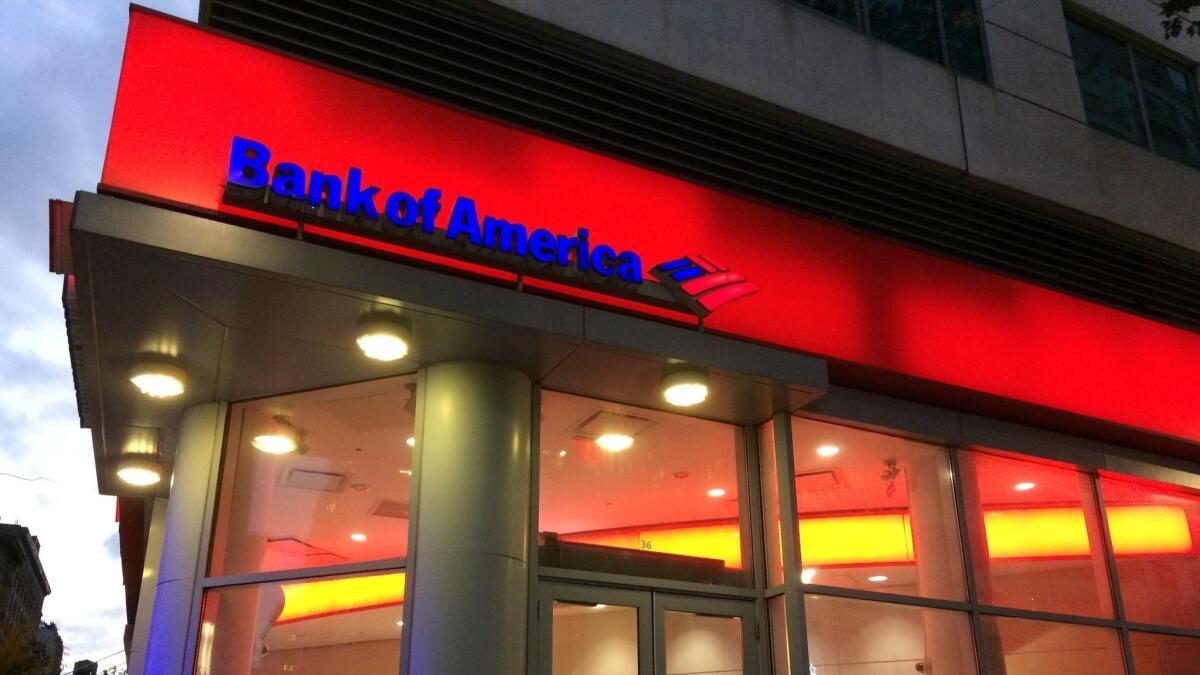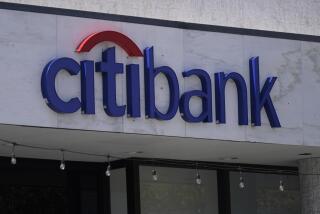Bank of America reportedly froze some accounts after asking customers about their citizenship

- Share via
In order to get a bank account in the U.S., customers need to provide their name, date of birth, address and an identification number, which may or may not indicate a person’s citizenship, federal regulators say.
But recent reports show that banks are also explicitly asking for an individual’s country of citizenship.
The Miami Herald in an article Thursday recounted how a PhD student from Iran who was studying at the University of Miami had his Bank of America account frozen after documentation he had provided as proof of legal residency was not accepted.
In another incident, the Kansas City Star reported last month that a Wichita-born man’s account with the Charlotte, N.C., banking giant was frozen after he ignored a form asking if he was a U.S. citizen or held dual citizenship.
Christopher Feeney, a spokesman for the bank, said that all banks are required to maintain “complete and accurate records” of their customers in order to comply with regulations, including those issued by the Treasury Department’s Office of Foreign Assets Control, which enforces economic and trade sanctions.
“The regulations are not meant to determine immigration status,” he said in the statement. “Like other banks, we ask for information about citizenship so that we can comply with the country-specific sanctions as well as customer due diligence requirements mandated by the U.S. government.”
Bank of America isn’t alone.
A U.S. Bank spokeswoman said the institution requires individuals to state their country of citizenship as part of so-called Know Your Customer rules to prevent against crimes such as money laundering.
A JPMorgan Chase Bank spokeswoman said the bank asked customers about their citizenship, along with other questions such as residence and occupation, as part of regular due diligence.
And a spokesman from Citibank said customers may be asked to provide a “variety of information, including citizenship,” as part of the company’s compliance with policies ranging from anti-money laundering to economic sanctions laws.
However, individuals do not need to be a citizen to open a bank account in the United States, according to a spokesperson with the Office of the Comptroller of the Currency, which regulates all national banks.
The federal Bank Secrecy Act, though, requires banks to establish the identity of all their customers in order to comply with laws designed to detect money laundering, terrorist financing and other financial crimes.
As part of that protocol, banks must collect a taxpayer identification number; for a “non-U.S. person,” there are other options if he or she does not have the taxpayer number. Among them are a passport number with country of issuance or an alien identification number, according to the Federal Financial Institutions Examination Council, which develops standards for federal monitoring of financial institutions.
Banking consultant Bert Ely said banks must adhere to “Know Your Customer” regulations, which help them discourage and ferret out possible financial crimes. However, the interpretation of those rules can vary.
“There’s a lot of judgment calls that get made in these areas,” said Ely, principal of Alexandria, Va.-based Ely & Co. Inc.
These requirements are also reviewed by federal examiners, said Beth Mills, spokeswoman for the California Bankers Assn., an industry trade group.
“There’s a number of questions banks may ask customers,” she said. “Citizenship may be one of those.”
These laws have been in place for well over a decade, but the California Reinvestment Coalition, which advocates for fair lending for low-income and minority communities, said it has been receiving a handful of questions about bank inquiries.
Executive Director Paulina Gonzalez said there is increased fear in immigrant communities about the potential consequences of revealing citizenship due to the current political climate.
“To have a bank ask a question related to citizenship, there is, I think, a fear that spread that if I answer this question, where does that information go,” she said.
Feeney, of Bank of America, said citizenship status was not considered in establishing bank accounts and was “not shared with any other party.”
aurora.percannella@latimes.com
Twitter: @smasunaga, @auropercannella
More to Read
Inside the business of entertainment
The Wide Shot brings you news, analysis and insights on everything from streaming wars to production — and what it all means for the future.
You may occasionally receive promotional content from the Los Angeles Times.









